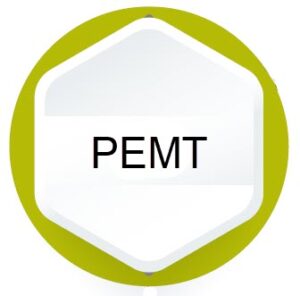PEMT gene mutation

The PEMT gene is responsible for the repair and regeneration of your body’s cells.
This gene encodes an enzyme that converts phosphatidylethanolamine to phosphatidylcholine by sequential methylation in the liver.
Phosphatidylcholine keeps your cell membranes fluid healthy, allowing the cells to function at their best. If the cells become stiff, unhealthy, and or can’t function, they can’t move nutrients into your cells or move harmful (toxins & waste products) out of the cells.
If you have PEMT gene mutations you won’t be able to methylate enough Phosphatidylcholine which can result in your body’s cells shutting down allowing your cells to become toxic and malnourished which can lead to almost any disease.
Common signs of phosphatidylcholine deficiency:
- High blood cholesterol
- Excess fat
- Fatty liver
- Nerve degeneration
- High blood pressure
- Atherosclerosis
- Senile dementia
- Reduced resistance to infection
- Developmental abnormalities in newborn babies
- Nutritional deficiencies
- Toxicity
- Problems with methylation and or homocysteine balance
PEMT & Fatty liver & high triglycerides
When you have PEMT gene mutations, you will likely make less phosphatidylcholine. Phosphatidylcholine has the important job of helping to move fats such as triglycerides out of your liver and blood. People who have the non-alcoholic fatty liver disease usually have phosphatidylcholine decline.
Let’s take a look at the PEMT genes, as you can see there are homozygous (double bad copies in red):

If you have problems with elevated cholesterol and or triglycerides Get help from a practitioner who understands PEMT here

